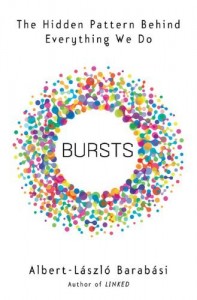 Sometimes (more often than not), I wait too long to get to writing about books I’ve read. I read Bursts by Albert László Barabási a few months ago, and having a memory like a sieve, I’ve already forgotten a lot of details. But, the basic idea is this: humans are more predictable in our behavior than we would ever expect.
Sometimes (more often than not), I wait too long to get to writing about books I’ve read. I read Bursts by Albert László Barabási a few months ago, and having a memory like a sieve, I’ve already forgotten a lot of details. But, the basic idea is this: humans are more predictable in our behavior than we would ever expect.
A truly random behavior is often characterized by Brownian motion, named after the guy who discovered it, a guy named Brown, of course. It was Einstein who understood it and it has become a mainstay of our understanding of how random processes occur, such as the motion of atoms in solids and molecules in liquids.
If humans acted in a Brownian way, we could predict certain aspects of human behavior, such as the average time to move from one place to another, but not much more. It turns out that humans and our associated activities are not so Brownian — not so random — and we are more predictable than that. Our behavior follows “bursts”, in which our patterns are punctuated by long periods of relatively quiet activity followed by bursts of focused activity. These bursts are indicators of non-random behavior.
As an example, we don’t check our email at random intervals throughout the day. There are times in which we don’t check or answer email for a while, then sudden bursts where we fire off a number of emails in very fast succession. The same is pretty much true of everything we do, whether we are aware of it or not. This makes us much more predictable than we would think.
In fact, Barabási says that if you give him details of your activity for about 2 months or so, he can predict with better than 80% accuracy what you will do in your day.
Barabási spends a lot of time discussing the implications of this fact, from identifying terrorists (from abnormal behavior) or the fact that advertisers know better than us what we will be doing, and target us very effectively.
Interspersed with his discussion of randomness is a tale from Hungarian history, the story of György Dózsa, a nobel who first was given command of a Crusade against the Ottomans which became a peasant revolt against the nobility of Hungary. I won’t spoil the end, but it is gruesome. Barabási weaves this story throughout his narrative as an attempt to show both how predictable and unpredictable history is. I’m not sure it works nor adds to the basic point of his book, but it is an interesting historical anecdote. I did learn something about a little known aspect of European history. If this guy had been successful in his revolt, Europe might have turned out very different.
In the end, this book gives some very interesting insight into human behavior and points to the danger that companies and governments will know us better than we know ourselves. I already am wary of advertisers as they know our mental propensities better than us, knowing how to appeal to those parts of us that we barely are aware of. With the insight from work such as Barabási’s, they will also know our behavior, our activities and be able to predict what we are going to do. This kind of research offers fascinating new insight into what it means to be human, but also opens the door to more control of our lives.